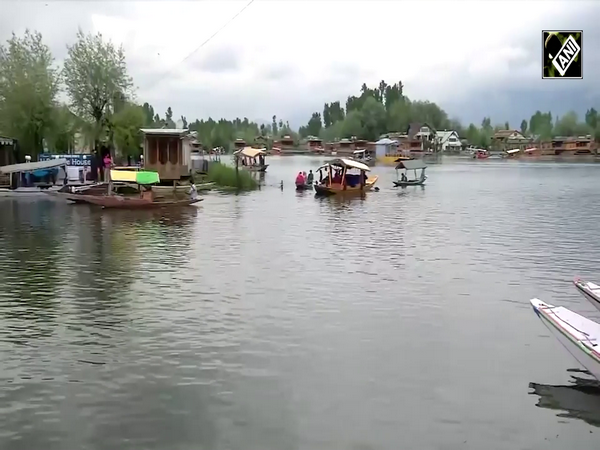
Philippines to hold military exercise with US amid escalating tensions with China
Apr 20, 2024
Manila [Philippines], April 20 : After reaffirming their bilateral ties at the unprecedented trilateral summit held at the White House on April 12, Philippines is set to hold a military exercise with the forces of US and Japan from April 22 to May 10, Nikkei Asia reported.
"The Armed Forces of the Philippines (AFP) and the U.S. military will conduct the 39th iteration of Balikatan, the largest annual bilateral training exercise between the two Allies, from April 22 to May 10. The exercise directly supports the U.S.-Philippine Mutual Defense Treaty by enhancing military cooperation and readiness between the two militaries," US Embassy in Philippines said in an official statement.
More than 16,000 members of the AFP and U.S. military will train together this year. Contingents from the Australian Defence Force and, for the first time in Balikatan's history, the French Navy will also join the exercise as participants. Meanwhile, 14 nations will participate as part of the AFP-hosted international observer program: Brunei, Canada, France, Germany, Great Britain, India, Indonesia, Japan, Malaysia, New Zealand, Republic of Korea, Singapore, Thailand, and Vietnam, it added.
Soon after a trilateral summit at the White House, the Philippine coast guard welcomed the resulting "positive endeavor" in maritime security with Japan and the U.S., with some experts asserting Manila has left itself room to improve relations with Beijing regarding longstanding tensions in the South China Sea.
In its statement regarding the military exercise, Philippines Coast Guard welcomed the development saying, "The Philippine Coast Guard (PCG) has welcomed the recent announcement during the trilateral summit between the Philippines, Japan, and the U.S., specifically on the establishment of a trilateral maritime dialogue to enhance coordination and collective responses to promote maritime cooperation," Nikkei Asia reported citing the PCG statement released Friday afternoon.
In a related matter, talks on a reciprocal access agreement between Manila and Tokyo are said to be in the final stage. Such a pact would facilitate the movement of military forces between the countries, making it easier for the Armed Forces of the Philippines (AFP) and Japan's Self-Defense Forces to conduct joint exercises. Washington and Manila already have a similar setup called the Visiting Forces Agreement, Nikkei Asia reported.
"We also consider the planned trilateral maritime exercise and capability as a positive endeavor that will boost maritime operations' interoperability," the PCG statement says.
Japan and the U.S. have cooperated in supporting the PCG's capacity building, and the three countries held trilateral Coast Guard exercises for the first time last June.
A joint statement released after the Marcos-Kishida-Biden summit revealed that security ties are tightening. "The United States looks forward to welcoming Philippine and Japan Coast Guard members onto a U.S. Coast Guard vessel during a patrol in the Indo-Pacific this year," it says.
Several experts have commended the Philippines for strengthening its defense ties with Japan and the US, Nikkei Asia reported.
"Marcos' decision to engage in today's trilateral summit with Biden and Kishida is upping the ante versus China," Derek Grossman, a senior defense analyst at the California-based thinktank Rand Corp., told Nikkei Asia. "It carries some risk, but there does not seem to be any other viable alternatives if Beijing is going to continue to claim much of Manila's EEZ."
Yusuke Takagi, a Southeast Asia expert and associate professor at the National Graduate Institute for Policy Studies in Japan, agreed. "A big problem is whether China's maritime expansion [into the South China Sea] continues or stops," he said. "As there is no sign China will stop ... it would be a good strategy for the Philippines to add partners as much as it can through multilateral cooperation."
According to the Nikkei Asia report, Chinese vessels have repeatedly shot water cannon blasts at Philippine ships running supply missions in the South China Sea. Since being elected in 2022, Marcos has upended the pro-China policy stance of his predecessor, Rodrigo Duterte, and begun asserting Manila's sovereignty over parts of the South China Sea.
The summit statement criticizes China by name. "We express our serious concerns about the People's Republic of China's (PRC) dangerous and aggressive behavior in the South China Sea," it says.
China, which claims almost the entire body of water, was quick to respond. Immediately after the trilateral meeting, Mao Ning, Chinese foreign ministry spokesperson, said in a statement, "China firmly rejects anything that creates and drives up tensions and may undermine other countries' strategic security and interests."
The Philippines is not the only ASEAN country with sovereignty claims in the South China Sea that overlap with China's audacious claim. But another aspect of the Philippines' relationship with China does set it apart: It derived little additional benefit from its warmer ties with China during the Duterte era. It is this factor that appears to have pushed Marcos to move closer to Japan and the US.
"Once Marcos became president, he recognized that his predecessor's China policy hadn't brought any tangible benefits to the Philippines, and that it was roundly unpopular among the people," Grossman said. "China's Belt and Road Initiative, for example, resulted in virtually no new infrastructure and investment."
Don McLain Gill, an analyst and lecturer at De La Salle University in Manila, had similar thoughts. He considers the trilateral partnership "an important breakthrough" for the Philippines, one that could be "a stepping stone" to enhancing its maritime security capabilities. But, he stressed, "this is also an opportunity to strengthen other forms of cooperation, particularly in economics and trade and industry."
There is also agreement among pundits that Marcos' decision to move closer to Japan and the US will not prevent the Philippines from improving its ties with Beijing.
Julio Amador, CEO of Amador Research Services in the Philippines, sees the trilateral summit as "one of the most important diplomatic wins" in recent years. But, he added, "building security relations further with Japan and the U.S. should not mean that Manila should needlessly antagonize Beijing.
"The Philippines must work with China in reducing overall tensions in the area, but Beijing needs to be a credible and trustworthy actor. It has not shown that it is willing to do so. The ball is in Beijing's court," Amador told Nikkei Asia.
Wataru Kusaka, a professor at Tokyo University of Foreign Studies and an expert in Philippine studies, believes the political and geopolitical situations made Marcos step into the Japan-U.S. camp. "As anti-China public opinion is growing in the Philippines, President Marcos wanted to warn against China. But not to do too much," he said.
The Philippines has a longstanding relationship with China partly due to the countries' economic and geographic proximity.
He said Manila's subsequent action toward China will be vital in balancing China and countries such as the US. and Japan. "The U.S. and Japan," he added, "should not force the Philippines" to take one side or the other.



























